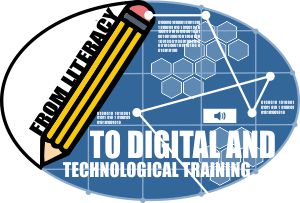
The education of adult persons is in many occasions conceived as a basic education focused mainly on social and personal fulfillment, but with limited possibilities of employability, especially if they are at risk of exclusion or suffer from serious obstacles. In this sense, Unesco’s definition (1997) is worth highlighting, which defines it as a process by which people who have completed their initial cycle of continuous education begin another sequential and organized activity to obtain changes in the informational, knowledge, and educational field, understanding, skills, appreciation, and attitudes.
On the contrary, the European Union in its different Lifelong Learning Programs, and since 2014 through Erasmus Plus, has tried to promote Adult and Lifelong Education, due not only to social demands but also to the need to acquire key qualifications for the world of work among people over 18 years of age who neither study nor work (NEET), as a mechanism to seek new productive models (Communication from the European Commission “A new concept of education: investing in skills to achieve better socio-economic results” – Strasbourg 2012). It should be noted that, according to the annual educational report “Education Landscape 2018“, the percentage of NEETs in Spain between 15 and 29 years old is 19.9%, compared to the 13.4% registered on average both in the OECD and the EU.
In these new production models, the innovation and technology sector stands out in a striking way, which in 2018 once again broke records with a growth rate that was five times that of the rest of the industries (Atomico 2018 report) and has become the engine of the stunted European economy with an investment of more than 20,200.00 million (21% more than in 2017). All this defines this sector as one of those with the greatest capacity for contracting, movement of capital and that is going to be more and more powerful, according to the study itself.
In these new production models, the innovation and technology sector stands out, which in 2018 once again broke records with a growth rate that was five times that of the rest of the industries (Atomic 2018 report), and has become the engine of the stunted European economy, with an investment of more than 20200 million € (21% more than in 2017). All of this defines this sector as one of those with the greatest hiring capabilities, to move capital, and which will become more and more powerful, according to the study itself.
Also, this sector stands out for its great appeal among the population between 18 and 30 years old, since it develops cutting-edge technology with great motivational capabilities for these adult students, enhancing employability among very diverse groups and profiles (it is not necessary to have a higher degree, there are jobs in this sector that are suitable for adults without or with low qualifications), provided that they demonstrate certain capabilities and skills that allow them to carry out their functions successfully and safely: critical analysis, scientific thinking, responsibility, group work, instinct for improvement, and commitment among others.
Thus, because of its economic potential, the structure of its companies, the characteristic hiring processes, and an appealing work environment, companies in the technology sector are good candidates for the employability of adults who left their basic studies and have not been able to access the labor market, but have an elementary educational base.

To do this, the project “FROM LITERACY TO DIGITAL AND TECHNOLOGICAL TRAINING” aims to generate a training itinerary adapted to each student, to guide them from basic literacy stages to digital and technological training, adapting the contents and materials to their prior knowledge, to develop the skills and knowledge that facilitate their employability in high-tech work centers, especially if these adults are part of groups at risk of exclusion or have specific obstacles.

This project aims to generate a great impact not only on the beneficiary group (adults between 18 and 30 years old who left the education system and, due to this and other obstacles, have not been able to access the labor market), but also on each of the social entities (from diverse and complementary fields) and the sectors to which they belong (lifelong education centers, technology-based companies, public institutions, etc.).
Thus, we can speak about multiple target beneficiaries:
- Adults who neither study nor work (NEET): this group constitutes the main beneficiary group; adults with a low educational levels who have not entered the labor market and need a personalized and complete process from basic literacy to the development of certain specific technological skills and competences to improve their employability potential.
- Lifelong learning and adult education centers: the participating national and European lifelong training centers are also direct recipients who can use the results by offering the course in their training catalogue.
- Networks and clusters of technology-based companies and research centers: showing them in a clear and dynamic way the benefits provided by adults who have completed our course, to integrate them into their network and promoting the employability of this group through internships practices and hiring, they thus also become direct recipients. These companies also have the ability to design specific actions to transfer their and their sector’s training needs to the educational materials created in the course.
- Public bodies and entities in the field of European education: we are encouraging their involvement to disseminate the project’s results and good practices; we will try to reach an agreement to include the Intellectual Outputs in other educational centers and organizations.
- Other stakeholders: lifelong learning and adult education centers that are part of the European networks in which UMinho, NTUA, and Greta du Velay are included, and networks of technology-based companies and research centers related to Ikasia and Nanopaint. In this stage, they are getting to know the project and the opportunities it can offer them.




